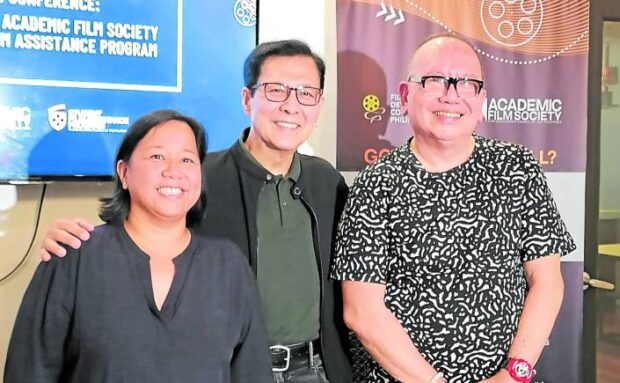What’s the use of participating in festivals and film markets if we have nothing to show for it?” said Film Development Council of the Philippines (FDCP) chair Tirso Cruz III on Thursday when he formally launched the creation of the Academic Film Society (AFS), as well as a program that will provide cash grants to student filmmakers.
Schools and institutions that are offering film, communication and visual arts courses, accredited senior high schools offering special programs for the arts, and student film organizations certified by their colleges or universities may apply to become a member of the AFS.
AFS members will have exclusive access to FDCP film school workshops, films available in the FDCP library, mentors and resource persons for film, trainings for teachers of film and media arts, access to the use of FDCP’s JuanFlix, and cinematheque centers for exhibition purposes, ratings and permits, and promotion of school events and programs.
College students who are enrolled in AFS-registered schools may also avail of cash grants (from P30,000 to P50,000) through the Student Film Assistance Program.
“We are now streamlining the festivals that we will attend in the future, only those where we stand to gain a lot. We do not intend to go to festivals for mere presence,” Cruz recently told reporters, also recalling how frustrated he felt during recent trips because there was hardly any content to share in film markets.
“On the other hand, our experience in Berlin was quite inspiring. Our booth was small, but a lot of people came over to say they were interested in going to the Philippines because they want to shoot here or coproduce with us. That’s our new assignment: to make our incentives and programs more attractive to foreign producers. It was funny because while the other booths were already packing up, we were still working,” the FDCP chief recalled.
Free workshops are also included on the list of FDCP programs this year, said filmmaker Jose Javier Reyes, who also serves as technical consultant. “They will be set up in the provinces, as well, because, while Metro Manila is the filmmaking center, children in the regions also need to benefit from this,” Reyes pointed out.
Workshops on scriptwriting (to be facilitated by members of the Filipino Screenwriters Guild), cinematography (under the Lupon ng Pilipinong Sinematograpo) and acting (in cooperation with Aktor and Meisner Studio Manila of Angeli Bayani) will be conducted in key cities in the country. Meanwhile, the acting workshop will have three levels: amateurs, intermediate and masters.
“We are pushing for this, even if we hit ‘zero budget.’ While this can be costly, it’s important. Children have everything to gain from this,” Reyes said.
Opportunities abroad
The FDCP has been giving opportunities to young filmmakers, especially those who want to get accepted in film labs abroad, said indie director Rica Arevalo, who is also head of the education division. “We’ve sent a lot of them abroad, like in Busan, Berlin and Cannes. We paid for their airfare, as well as for their badges in the film labs they attended. Since July 2022, we have sponsored 55 filmmakers, sent them to different areas in Europe, the United States and other Asian countries,” Arevalo said.
When asked what for him was the best part about being the FDCP chair, especially since he now has to prioritize this over his acting projects, Cruz replied, “The best part really is the learning process. The people I’m working with, like Direk Joey or Rica, make my life easier. I’m lucky that I have these people behind me. Especially those who have been with the FDCP for five years or more, they know their jobs very well and they guide me.”
Cruz added that discovering the big difference between working in front of the camera and working behind it, while with the FDCP, actually shocked him. “My first trip as chair was in Switzerland (for the Locarno International Film Festival). Nagulantang ako. The experience shook me to my core. I said, ‘What did I get myself into?’ This job is not easy at all.”
Cruz admitted that he personally asked Reyes for help. “It was 8 a.m. on a Sunday when I sent him the message. He hadn’t had coffee yet, but he said ‘yes’ and could no longer take it back,” said Cruz. “I’ve always said that when my term ends, I will have no regrets.”
Limited budget
He continued: “If only people knew how tedious the process is before we can actually provide them the assistance they seek. May nagtatampo pa. At the start, I told my team that we should come up with programs and protocols because we will eventually encounter people who’d call us biased. Also, while our budget is very limited, it is still the money of the people. Maingat na maingat kami sa FDCP.”
Was letting his work as FDCP chair take precedence over his acting career all worth it? “Definitely. We’re now looking to the future, and we see our youth taking a major part in it. Like what Direk Joey once said, we’re amazed that our filmmakers are able to make do with the limited budget they have and still come up with good products. I’m impressed by their bravado, their ability to take risks.”
“We’ve known [Cruz] as an actor for five decades, but as a leader, he delegates and listens to suggestions,” Arevalo said of the FDCP chief. “Rest assured that the people under him are really good, that, with him as the leader, there is check and balance.” INQ


